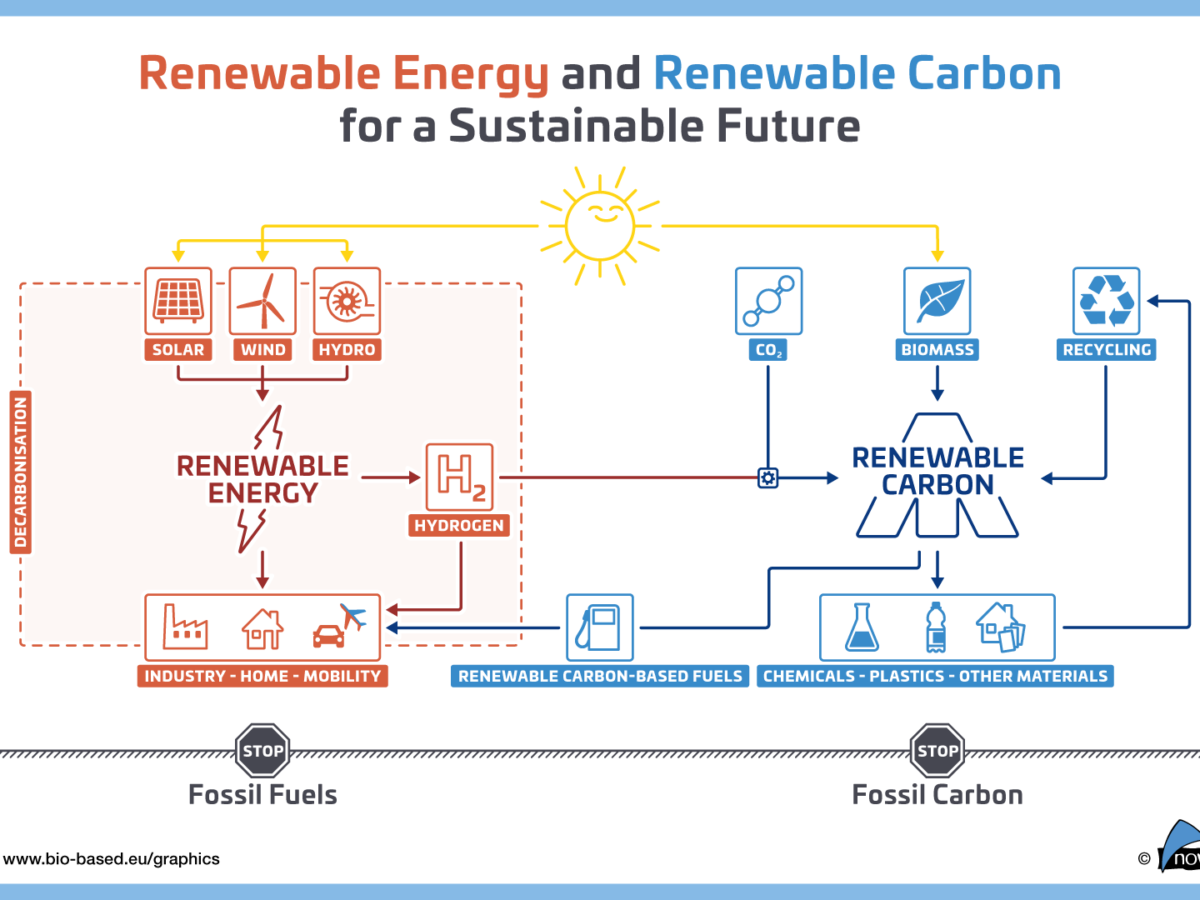Back around 2015, diagrams like the above began popping up — depicting the bleeding-edge intersection of climate policy and industrial innovation, in the line of the wondrous memes, “Circular Economy” & “Cradle-to-Cradle.”
Attempts to boot up even little bubbles of a Circular Economics have been aspirational or fragmentary at best. For the whole thing to work you really need incredibly tight-knit collaboration between many entities in the materials and business ecosystem – raw material producers, manufacturers, retail, recycling & waste collection, it all needs to loop together. (And where do banks fit?!) The maximal vision here is Bill McDonough’s “Design for Re-Use.”
Making ALL products (including all plastics & polymers) from non-petroleum sources is a huge call.
It makes sense logically, and within a certain narrowed frame, ecologically, as a lot of petroleum derivatives are fairly toxic (a fraction of every barrel of petrol goes to chemicals & plastics manufacturing, that’s tons of nasty stuff).
Technically, it’s daunting but maybe doable. Many methods are in R&D. (Fermenting PHA bioplastic, or extracting other Designer Goop from bio-engineered algae.) To date, an entire generation of venture-funded, wanna-be “bio-based” producers in the above vein crashed at the scalability stage — trying to take what works in a lab at the scale of grams or pounds up to tons is tough. In short, it’s been a bitch to pull off economically.

So, it looks like nova-Institute, led by Michael Carus has made good use of the COVID pause to crystallize support for a new initiative, setting the bar as high as possible.
Even in some radically more egalitarian economy, these practices of restructuring the life-cycle of materials would be necessary… correct?
World market leaders take climate protection seriously: New initiative to replace fossil with renewable carbon wants to change the foundation of the chemical industry
Eleven leading companies from six countries founded the Renewable Carbon Initiative (RCI) in September 2020 under the leadership of novaInstitute (Germany). The aim of the initiative is to support and speed up the transition from fossil carbon to renewable carbon for all organic chemicals and materials. More than 100 well-known experts support the initiative personally. Companies, start-ups and institutes are welcome to join the initiative as a member.
The first eleven pioneer companies to become a member of the RCI and form the Core Advisory Board are: Beiersdorf (Germany), Cosun Beet Company (The Netherlands), Covestro (Germany), Henkel (Germany), LanzaTech (USA), Lenzing (Austria), NESTE (Finland), SHV
Energy (The Netherlands), Stahl (The Netherlands), Unilever (UK) and UPM (Finland).
The Renewable Carbon Initiative (RCI) addresses the core problem of climate change, which is largely related to extracting and using additional fossil carbon from the ground. The vision is stated clearly: By 2050, fossil carbon shall be completely substituted by renewable carbon, which is carbon from alternative sources: biomass, direct CO2 utilisation and recycling. The founders are convinced that this is the only way for chemicals, plastics and other organic materials to become more sustainable, more climate-friendly and part of the circular economy
– part of the future.
The Renewable Carbon Initiative urges the industry to go beyond just using renewable energy. All fossil carbon use has to end, as the carbon contained in the molecules of organic chemicals and materials is prone to end up in the atmosphere sooner or later. Only a full phase-out of fossil carbon will help to prevent a further increase in CO2 concentrations. Consequently, companies are encouraged to focus on phasing out fossil resources and to use renewable carbon instead. The members of the RCI share and support this vision and will work together on this goal. The initiative will drive this message, initiating further actions by bringing stakeholders together, providing information and shaping policy to strive for a climate-neutral circular economy.Michael Carus, CEO of nova-Institute and head of the Renewable Carbon Initiative: “This is about a fundamental change in the chemical industry. Just as the energy industry is being converted to renewable energies, so renewable carbon will become the new foundation of the future chemical and material industry. The initiative starts today and will be visibly present from now on. We want to accelerate the change.”
Over the next couple weeks, the Renewable Carbon Initiative will publish more information on its aims and benefits via a wide range of social media activities. This includes a website and social media presence, a poster, cartoons and video-clips to educate companies and end users
about sustainable options and support action.The main avenues on which the initiative wants to deliver change are threefold. One, the initiative strives to create cross-industry platforms that will demonstrate feasibility of renewable carbon in tangible activities.
Two, one main target will be to advocate for legislation, taxation and regulation changes to give renewable carbon a level commercial playing field to play on.Finally, the third avenue will be to create a wider pull for sustainable options by raising awareness and understanding of renewable carbon level amongst the business community and the wider public.
So, that’s all well and good, in theory.
Still, one might ask some questions about how all this would work at the scale that is envisioned. (Bcuz, like, y’know, apparently nobody bothered to ask that about renewables.)
- The potentially scary implications of “How Writing New Genomes Can Transform Manufacturing.” (Yes, that’s a direct quote, from SynBioBeta Conf 2020 web hype. Of course, they are not talking about human genomes. But the microbes they wish to “recode” are the “archaia” & foundation of Mama Gaia. What could go wrong?)
- How much biomass can we / should we convert into products, rather than let decompose and feed the soil microbiome?
- Can CO2 from the air really be captured at scale economically? Why did so many algae startups fail?
- Do we really want to recruit the entire biosphere & food chain to support our profligate consumption (actually, we’ve almost done that already, according to the latest stats)?
Stay tuned…





